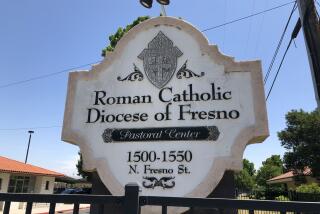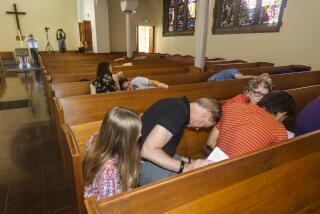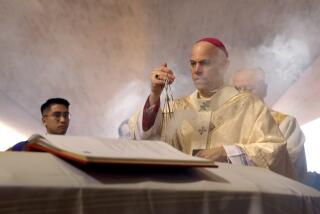Financial Crisis Grips Worldwide Church of God : Religion: Leaders plan cutbacks in the wake of a 30% plunge in revenues. Changes in doctrine have rocked the congregation.
Rocked by members’ reaction to major reversals of its most fundamental doctrines--including a new declaration that tithing is no longer mandatory--the Worldwide Church of God is facing the most severe financial crisis in its history.
Leaders of the Pasadena-based church were meeting behind closed doors Wednesday, undertaking a top-to-bottom review of all church operations and personnel in the face of a decline in church revenues of at least 30% since the beginning of the year. Outside sources said the drop could be as high as 55%.
The first hint of the church’s financial reckoning came two weeks ago when, to the shock of the Southland’s music lovers and artistic community, the church announced that it would halt its $2.5-million annual subsidy to Ambassador Auditorium in Pasadena and canceled its 1995-96 concert season.
Already, the church has announced the layoff of 15% of its headquarters staff, and more layoffs are expected. It has made cutbacks in its magazine, Plain Truth, and salary cuts are likely. The church is also expected to consider any reasonable offer to buy its prime 56-acre headquarters in Pasadena.
An announcement of the church leadership’s decision is expected by Monday and could come as early as Friday, the church said.
Founded by the late Herbert W. Armstrong, the church has long been embroiled in controversy over its finances, its heretofore unique theological doctrines, and the personal conduct of some of its past leaders.
But the latest turn of events has been precipitated by a startling recanting by church leaders of long-held church teachings set down by its founder, who died in 1986.
Although most members have accepted the changes, a significant minority have not. During the last five years, the church conceded that 9,000 to 10,000 people--10% to 15% of its worldwide membership--have left the fold because of doctrinal differences.
The theological conflict began coming to a head in December when the church’s leader and Armstrong’s successor--Pastor General Joseph Tkach Sr.--announced in Atlanta that tithing was no longer mandatory.
At the same time, he also declared that it was no longer mandatory to observe the Sabbath on Saturday.
A year earlier, the church moved closer to traditional Christian teaching about the Trinity as three distinct personalities--God the Father, God the Son and God the Holy Spirit in one godhead. Previously, the church did not see the Holy Spirit as a distinct personality.
The changes in the church’s teachings have been seen as bringing the church closer into the mainstream of Christianity. But longtime members and church watchers say there is little doubt that Armstrong--who founded the church in 1934 as Radio Church of God in Eugene, Ore.--would have considered the revisions heretical.
Church officials and disaffected former members agreed Wednesday that the doctrinal changes were the primary cause of the crisis.
*
The changes have been so dramatic that some observers said a common joke around church headquarters these days is that the January, 1994, Northridge earthquake was actually Armstrong turning over in his grave.
But church officials said the financial crisis is no joking matter.
“We’re taking some hits,” manager of church relations Tom Lapacka said Wednesday. “It’s been costly. . . . Had we not made those doctrinal changes I doubt seriously that we’d have such a rapid decline in one small brief window of time.”
He said that during the last five years, more than 10,000 of its members have left the church in protest. He said the church has about 92,000 members worldwide, including 60,000 in the United States. But outside sources estimate that the church has closer to 60,000 members worldwide.
Tkach’s pronouncements on tithing and the Sabbath in Atlanta caught non-members as well as members by surprise.
“I was as shocked as anyone else. I thought if they upheld anything it would be the Sabbath . . . and the tithing. When he (Tkach) ripped out all of those cornerstones I was shocked as anyone else,” said Phillip Arnn of the Arlington, Tex.-based Watchman Fellowship, which keeps track of non-traditional faith groups.
Lapacka said in an interview Wednesday that the major reversal of church doctrines resulted from a continuing study of Scriptures and testing church doctrines against new Scriptural understanding.
“We came to see there were beliefs that we held that we didn’t feel could be supported by the Bible,” said Lapacka, who is an ordained minister in the church. “I’m very proud to be a part of a church that will look at the Bible and say this is how we read it and we’re going to make these changes, regardless of the cost to us as an institution.”
The changes in the church’s understanding of tithing, the Sabbath and the Trinity, he added, bring it more in conformity with New Testament Christianity and pull it away from much of its previous theological underpinnings found in the Old Testament or Jewish Scriptures.
Asked if the church now regretted that it may have been teaching false doctrine in the past, Lapacka said, “Yes, we always regret. We express regret.”
John Trechak, who left the church in 1973 and publishes a newsletter on the church, said the worst financial repercussions may still be ahead.
“It’s drastic, very drastic, and it’s probably going to get worse in the next few weeks,” Trechak said. “How they’re going to avoid bankruptcy I have no idea.”
As of Wednesday, Lapacka confirmed that 107 of the 708 positions at the Pasadena headquarters have been eliminated.
Circulation of the Plain Truth is expected to be cut to at least 1 million from the current 1.3 million. In addition, the magazine’s editions in French, Italian, Spanish and Norwegian will be eliminated. A separate edition published in England will be dropped and English readers will receive the U.S. edition.
*
Tkach’s private jet and limousine will be sold, the church has confirmed, and ministers salaries are likely to be cut. Also to be sold during the next two years is the church’s car fleet.
On Wednesday, the magnitude of the forthcoming cuts began to hit home. Employees at the campus worried Wednesday whether they would have jobs.
“This is a very difficult time,” said Kayte Wolverton, a receptionist in the church’s editorial department.
Pasadena city officials also worried about the impact on the city, not only because of job losses but because the church’s headquarters is located in an area the city says is key to Pasadena’s economic development.
“We’re certainly concerned about it and watching the whole situation very closely,” city public information officer Ann Erdman said. “One job lost to the city is substantially a big deal. It’s a huge chunk of land that is situated in an area that is considered to be very strategically important from an economic development standpoint.”
More to Read
Sign up for Essential California
The most important California stories and recommendations in your inbox every morning.
You may occasionally receive promotional content from the Los Angeles Times.










